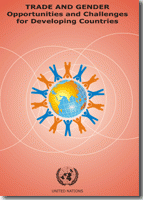
The United Nations has been an unequivocal advocate of gender equality ever since its establishment. Equal rights between men and women are enshrined as a fundamental human right in the UN Charter, and many international conferences have been held to further that goal. The outcomes of these conferences have been reflected in various internationally agreed instruments, the most important of which are the 1979 Convention on the Elimination of All Forms of Discrimination against Women and the 1995 Beijing Declaration and Platform for Action.
Notable progress has been achieved in some areas. Women´s participation in the labour force has increased in most regions of the world; women´s education, at the primary, secondary and university levels, has also improved significantly; and there are signs of a narrowing of the wage gap between men and women in many countries (most of them industrialized). However, in most nations women are still at a disadvantage in terms of their role and position in the economic and political arenas.
Against this background, the forces of globalization, of which international trade is one of the most important channels, may bring additional challenges and opportunities. Questions arise as to how the costs and benefits of trade can be evenly distributed by gender, and whether trade rules and policies deepen, or, on the contrary, reduce existing gender inequalities. There is therefore a need to assess the impact of trade on gender equality in order to assist countries in designing appropriate strategies and policies to support the objective of gender equality in the context of an open multilateral trading system.
It was with the dual objectives of deepening the understanding of the gender dimension of trade and identifying policy challenges and responses to meet the goal of gender equality that, in February 2003, the UN Inter-Agency Network on Women and Gender Equality created a task force on gender and trade, of which UNCTAD was designated task manager. The Task Force comprises UN agencies and regional commissions, the World Bank, WTO, OECD and the Commonwealth secretariat.
Various members of the Task Force have been studying the interconnections between trade and gender from different perspectives. Some of the findings of the analyses undertaken by UNCTAD, FAO, UNIDO, OHCHR, ITC and UNIFEM are published in this book. As the subject is novel and complex, a variety of views are expressed, which are not necessarily those of the Task Force or of the United Nations. Rather, the objective is to identify and review some complex technical issues with a view to sensitizing policy-makers on the importance of these issues, fostering discussion among experts and providing a good basis for consensus-building. The eleventh session of the United Nations Conference on Trade and Development (UNCTAD XI) in June 2004 will be an important forum for debating the policy implications of the trade and gender nexus. It is hoped that this publication will help policy-makers reinforce the role of trade as an instrument for truly inclusive development, and in the process ensure the equal right of men and women to earn a decent living.
Geneva and New York, 14 April 2004
| Rubens Ricupero Secretary-General of UNCTAD |
Angela E.V. King Special Adviser to the UN Secretary-General on Gender Issues and the Advancement of Women |


